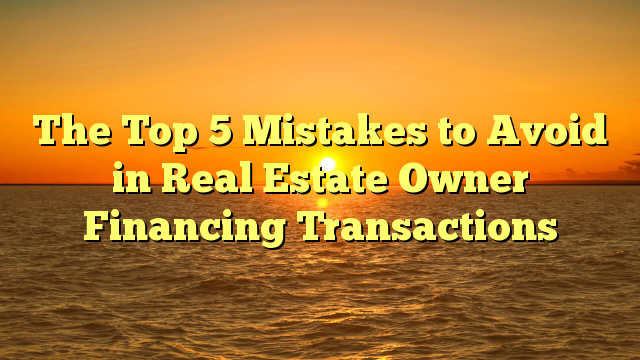The Top 5 Mistakes to Avoid in Real Estate Owner Financing Transactions
If you are considering owner financing when buying or selling a property, there are several mistakes that you should avoid to ensure a smooth and successful transaction. Owner financing can be a great option for buyers who cannot obtain traditional financing and for sellers who want to sell their property quickly. However, it can also be a complicated process that requires careful planning and execution. In this article, we will discuss the top five mistakes to avoid in real estate owner financing transactions.
Table of Contents
- Introduction
- Mistake #1: Not Understanding the Risks
- Mistake #2: Failing to Conduct Due Diligence
- Mistake #3: Not Creating a Proper Contract
- Mistake #4: Not Setting Realistic Terms and Conditions
- Mistake #5: Failing to Plan for the Future
- Conclusion
- FAQs
Mistake #1: Not Understanding the Risks
One of the biggest mistakes that buyers and sellers make in owner financing transactions is not fully understanding the risks involved. Owner financing comes with its own set of risks, and it is important to be aware of these risks before entering into a transaction. Some of the risks associated with owner financing include:
- Default: If the buyer is unable to make the payments, the seller could be left with a property that they cannot sell without going through a lengthy foreclosure process.
- Property Damage: If the buyer damages the property, the seller may have to spend time and money to make repairs before they can sell the property again.
- Interest Rate Risk: If interest rates rise, the seller may not be able to sell the note for as much as they originally anticipated.
Mistake #2: Failing to Conduct Due Diligence
Another common mistake is failing to conduct proper due diligence. Both buyers and sellers should do their homework to ensure that the property is a good investment and that the other party is trustworthy. Buyers should investigate the property thoroughly, including getting an appraisal and inspection, and researching the area and its potential for growth. Sellers should investigate the buyer’s credit history and ability to make payments, and ensure that there are no liens or other encumbrances on the property.
Mistake #3: Not Creating a Proper Contract
A third mistake is not creating a proper contract. A written contract is essential in any owner financing transaction, and it should outline all of the terms and conditions of the agreement, including the purchase price, interest rate, payment schedule, and any contingencies. The contract should also include provisions for default and foreclosure, as well as a clear outline of the responsibilities of both the buyer and the seller.
Mistake #4: Not Setting Realistic Terms and Conditions
Another mistake is not setting realistic terms and conditions. Both buyers and sellers should be realistic about what they can afford and what they are willing to accept. Sellers should set an interest rate and payment schedule that is fair and reasonable, and buyers should be realistic about their ability to make the payments. Buyers should also be aware that owner financing usually comes with a higher interest rate than traditional financing.
Mistake #5: Failing to Plan for the Future
Finally, a common mistake is failing to plan for the future. Both buyers and sellers should have a plan in place for what happens if things do not go according to plan. For example, the contract should include provisions for default and foreclosure, and both parties should have a plan in place for what happens if the buyer needs to sell the property before the note is paid off.
Conclusion
Owner financing can be a great option for both buyers and sellers, but it requires careful planning and execution. By avoiding these five common mistakes, you can ensure a smooth and successful transaction that minimizes risks and maximizes benefits for both parties involved. Remember to do your due diligence, create a proper contract, set realistic terms and conditions, and plan for the future to avoid potential pitfalls.
FAQs
- Is owner financing a good option for buyers? Yes, owner financing can be a good option for buyers who cannot obtain traditional financing. It allows buyers to purchase a property without having to go through a bank or lender.
- How can buyers protect themselves in an owner financing transaction? Buyers can protect themselves by doing their due diligence and investigating the property thoroughly. They should also make sure that there are no liens or other encumbrances on the property.
- What should be included in an owner financing contract? An owner financing contract should include all of the terms and conditions of the agreement, including the purchase price, interest rate, payment schedule, and any contingencies. It should also include provisions for default and foreclosure.
- Can the seller foreclose on the property if the buyer defaults on payments? Yes, the seller can foreclose on the property if the buyer defaults on payments. The contract should include provisions for default and foreclosure.
- What happens if the buyer needs to sell the property before the note is paid off? Both the buyer and the seller should have a plan in place for what happens if the buyer needs to sell the property before the note is paid off. This should be included in the contract and agreed upon by both parties.
- What are the risks associated with owner financing for sellers? The risks associated with owner financing for sellers include default, property damage, and interest rate risk. If the buyer is unable to make the payments, the seller may be left with a property that they cannot sell without going through a foreclosure process. Additionally, if the buyer damages the property or if interest rates rise, the seller may not be able to sell the note for as much as they originally anticipated.
- How can sellers protect themselves in an owner financing transaction? Sellers can protect themselves by conducting due diligence on the buyer, including investigating their credit history and ability to make payments. They should also create a proper contract that outlines all of the terms and conditions of the agreement, and includes provisions for default and foreclosure. Finally, sellers should be realistic about the terms and conditions they set, and plan for the future in case things do not go according to plan.
- Can owner financing be used for commercial properties as well as residential properties? Yes, owner financing can be used for both commercial and residential properties. It is a flexible option that can be customized to meet the needs of both buyers and sellers.
- What are the benefits of owner financing for buyers? The benefits of owner financing for buyers include the ability to purchase a property without having to go through a bank or lender, and the flexibility to negotiate the terms and conditions of the agreement. Additionally, buyers may be able to obtain financing more quickly and easily than they would with traditional financing.
- What are the benefits of owner financing for sellers? The benefits of owner financing for sellers include the ability to sell their property quickly and to receive regular payments over time. Additionally, sellers may be able to obtain a higher sale price than they would with traditional financing.



